大学英语修辞学第二章
- 格式:ppt
- 大小:522.50 KB
- 文档页数:24

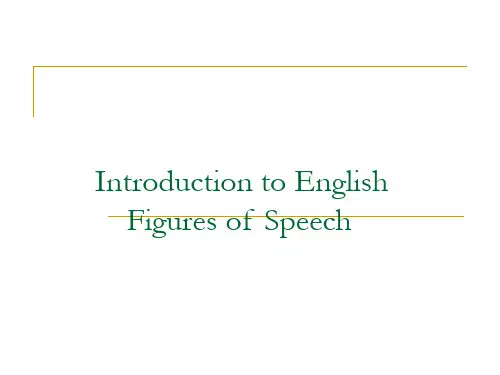
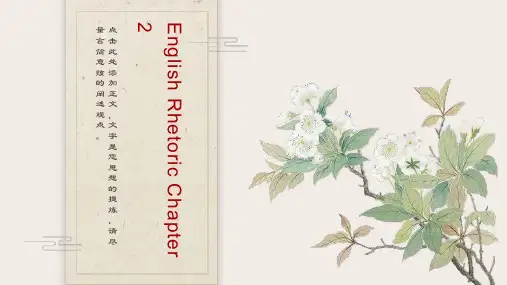
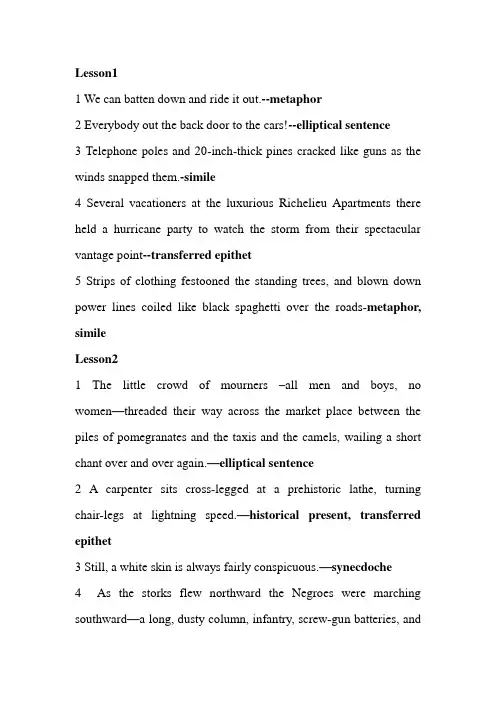
Lesson11 We can batten down and ride it out.--metaphor2 Everybody out the back door to the cars!--elliptical sentence3 Telephone poles and 20-inch-thick pines cracked like guns as the winds snapped them.-simile4 Several vacationers at the luxurious Richelieu Apartments there held a hurricane party to watch the storm from their spectacular vantage point--transferred epithet5 Strips of clothing festooned the standing trees, and blown down power lines coiled like black spaghetti over the roads-metaphor, simileLesson21 The little crowd of mourners –all men and boys, no women—threaded their way across the market place between the piles of pomegranates and the taxis and the camels, wailing a short chant over and over again.—elliptical sentence2 A carpenter sits cross-legged at a prehistoric lathe, turning chair-legs at lightning speed.—historical present, transferred epithet3 Still, a white skin is always fairly conspicuous.—synecdoche4 As the storks flew northward the Negroes were marching southward—a long, dusty column, infantry, screw-gun batteries, andthen more infantry, four or five thousand men in all, winding up the road with a clumping of boots and a clatter of iron wheels.—onomatopoetic words symbolism5 Not hostile, not contemptuous, not sullen, not even inquisitive.—elliptical sentence6 And really it was like watching a flock of cattle to see the long column, a mile or two miles of armed men, flowing peacefully up the road, while the great white birds drifted over them in the opposite direction, glittering like scraps of paper.—simileLesson31The fact that their marriages may be on the rocks, or that their love affairs have been broken or even that they got out of bed on the wrong side is simply not a concern.—metaphor2They are like the musketeers of Dumas who, although they lived side by side with each other, did not delve into, each other’s lives or the recesses of their thoughts and feelings.—simile3It was on such an occasion the other evening, as the conversation moved desultorily here and there, from the most commonplace to thoughts of Jupiter, without and focus and with no need for one that suddenly the alchemy of conversation took place, and all at once they was a focus.—metaphor4The Elizabethans blew on it as on a dandelion clock, and its seedsmultiplied, and floated to the ends of the earth.—simile5Even with the most educated and the most literate, the King’s English slips and slides in conversation.—metaphor ,alliteration 6When E.M. Forster writes of ―the sinister corridor of our age,‖ we sit up at the vividness of the phrase, the force and even terror in the image.—metaphorLesson51Charles Lamb, as merry and enterprising a fellow as you will meet in a month of Sundays, unfettered the informal essay with his memorable Old China and Dream’s Children.—metaphor2Read, then, the following essay which undertakes to demonstrate that logic, far from being a dry, pedantic discipline, is a living, breathing thing, full of beauty, passion, and trauma.—metaphor, hyperbole3Back and forth his head swiveled, desire waxing, resolution waning.—antithesis4What’s Polly to me, or me to Polly?—parody5This loomed as a project of no small dimensions, and at first I was tempted to give her back to Petey.==understatement6Maybe somewhere in the extinct crater of her mind, a few embers still smoldered. Maybe somehow I could fan them into flame.—metaphor, extended metaphorLesson71Here was the very heart of industrial America, the center of its most lucrative and characteristic activity, the boast and pride of the richest and grandest nation ever seen on earth—and here wasa scene so dreadfully hideous, so intolerably bleak and forlornthat it reduced the whole aspiration of man to a macabre and depressing joke.—metaphor, hyperbole, antithetical contrast 2Here was wealth beyond computation, almost beyond imagination—and here were human habitations so abominable that they would have disgraced a race of alley cats.—hyperbole, antithetical contrast3The country itself is not uncomely, despite the grime of the endless mills.—litotes, understatement4Obviously, if they were architects of any professional sense or dignity in the region, they would have perfected a chalet to hug the hillsides—a chalet with a high pitched roof, to throw off the heavy winter snows, but still essentially a low and clinging building, wider than it was tall.—sarcasm5And one and all they are streaked in grime, with dead and eczematous patches of paint peeping through the streaks.—metaphor6When it has taken on the patina of the mills it is the color of anegg long past all hope or caring.—ridicule ,irony, metaphor7I award this championship only after laborious research and incessant prayer.—irony8Safe in a Pullman, Ihave whirled through the gloomy, God-forsaken villages of Iowa and Lansas, and the malarious tidewater hamlets of Georgia.—antonomasia9It is as if some titanic and aberrant genius, uncompromisingly inimical to man, had devoted all the ingenuity of Hell to the making of them.—hyperbole ,irony10They like it as it is: beside it, the Parthenon would no doubt offend them.—irony11It is that of a Presbyterian grinning.—metaphorLesson101The slightest mention of the decade brings nostalgic recollections to the middle-aged and curious questionings by the young: memories of the deliciously illicit thrill of the first visit to a speakeasy, of the brave denunciation of Puritan morality, and of the fashionable experimentations in amour in the parked sedan ona country road; questions about the naughty, jazzy parties, theflask-toting‖ sheik‖ , and the moral and stylistic vagaries of the ―flapper‖ and the ―drug-store cowboy‖.—transferred epithet2Second, in the United States it was reluctantly realized bysome—subconsciously if not openly—that our country was no longer isolated in either politics or tradition and that we had reached an international stature that would forever prevent us from retreating behind the artificial walls of a provincial morality or the geographical protection of our two bordering oceans.—metaphor3War or no war, as the generations passed, it became increasingly difficult for our young people to accept standards of behavior that bore no relationship to the bustling business medium in which they were expected to battle for success.—metaphor4The war acted merely as a catalytic agent in this breakdown of the Victorian social structure, and by precipitation our young people into a pattern of mass murder it released their inhibited violent energies which, after the shooting was over, were turned in both Europe and America to the destruction of an obsolescent nineteenth century society.—metaphor5The prolonged stalemate of 1915-1916,the increasing insolence of Germany toward the United States, and our official reluctance to declare our status as a belligerent were intolerable to many of our idealistic citizens, and with typical American adventurousness enhanced somewhat by the strenuous jingoism of Theodore Roosevelt, our young men began to enlist under foreignflags.—metonymy6Their energies had been whipped up and their naive destroyed by the war and now, in sleepy Gopher Prairies all over the country, they were being asked to curb those energies and resume the pose of self-deceiving Victorian innocence that they now felt to be as outmoded as the notion that their fighting had “made the world safe for democracy‖.—metaphor7After the war, it was only natural that hopeful young writers, their minds and pens inflamed against war, Babbittry, and‖ Puritanical‖gentility, should flock to the traditional artistic center(where living was still cheap in 1919)to pour out their new-found creative strength, to tear down the old world, to flout ht morality of their grandfathers, and to give all to art, love, and sensation.—metonymy synecdoche8Younger brothers and sisters of the war generation, who had been playing with marbles and dolls during the battles of Belleau Wood and Chateau-Thierry, and who had suffered no real disillusionment or sense of loss, now began to imitate the manners of their elders and play with the toys of vulgar rebellion.—metaphor9These defects would disappear if only creative art were allowed to show the way to better things, but since the country was blindand deaf to everything save the glint and ring of the dollar, there was little remedy for the sensitive mind but to emigrate to Europe where‖they do things better.‖—personification, metonymy ,synecdoche。
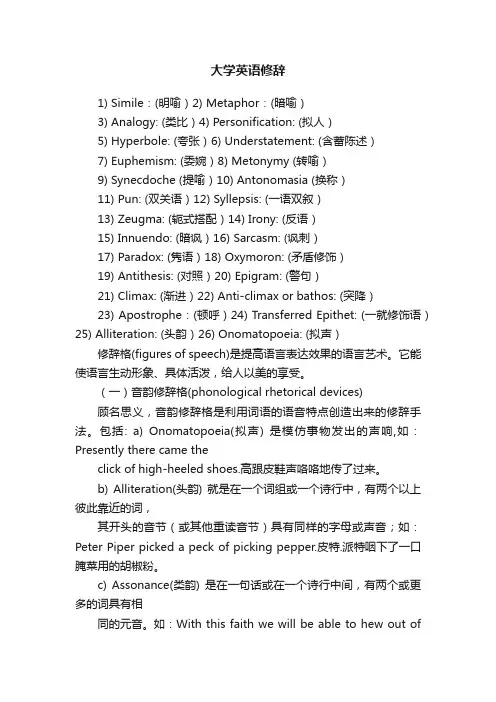
大学英语修辞1) Simile:(明喻)2) Metaphor:(暗喻)3) Analogy: (类比)4) Personification: (拟人)5) Hyperbole: (夸张)6) Understatement: (含蓄陈述)7) Euphemism: (委婉)8) Metonymy (转喻)9) Synecdoche (提喻)10) Antonomasia (换称)11) Pun: (双关语)12) Syllepsis: (一语双叙)13) Zeugma: (轭式搭配)14) Irony: (反语)15) Innuendo: (暗讽)16) Sarcasm: (讽刺)17) Paradox: (隽语)18) Oxymoron: (矛盾修饰)19) Antithesis: (对照)20) Epigram: (警句)21) Climax: (渐进)22) Anti-climax or bathos: (突降)23) Apostrophe:(顿呼)24) Transferred Epithet: (一就修饰语)25) Alliteration: (头韵)26) Onomatopoeia: (拟声)修辞格(figures of speech)是提高语言表达效果的语言艺术。
它能使语言生动形象、具体活泼,给人以美的享受。
(一)音韵修辞格(phonological rhetorical devices)顾名思义,音韵修辞格是利用词语的语音特点创造出来的修辞手法。
包括: a) Onomatopoeia(拟声) 是模仿事物发出的声响,如:Presently there came theclick of high-heeled shoes.高跟皮鞋声咯咯地传了过来。
b) Alliteration(头韵) 就是在一个词组或一个诗行中,有两个以上彼此靠近的词,其开头的音节(或其他重读音节)具有同样的字母或声音;如:Peter Piper picked a peck of picking pepper.皮特.派特咽下了一口腌菜用的胡椒粉。
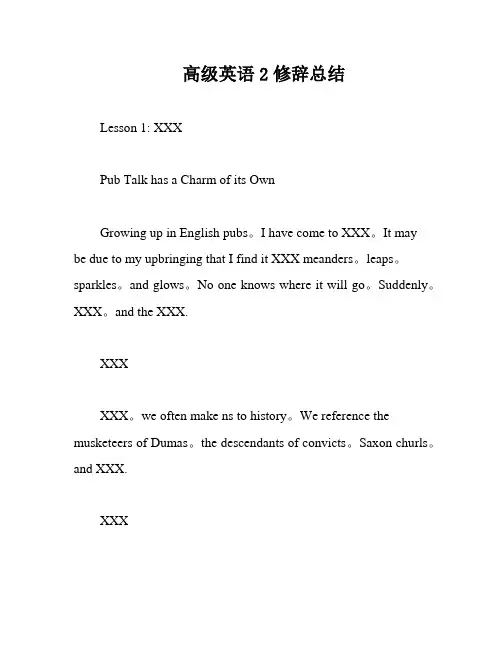
高级英语2修辞总结Lesson 1: XXXPub Talk has a Charm of its OwnGrowing up in English pubs。
I have come to XXX。
It maybe due to my upbringing that I find it XXX meanders。
leaps。
sparkles。
and glows。
No one knows where it will go。
Suddenly。
XXX。
and the XXX.XXXXXX。
we often make ns to history。
We reference the musketeers of Dumas。
the descendants of convicts。
Saxon churls。
and XXX.XXXXXX for effect。
For example。
getting out of bed on the wrong side is not a XXX。
we may say it to add humor or emphasize a point.XXXXXX。
They help us express complex ideas in a simple way。
For instance。
we ought to think ourselves back into the shoes ofthe XXX and way of life。
Another example is the XXX ideas spread like seeds。
XXX.Avoiding Slip-XXXWhile pub talk has its charm。
it is XXX in our language。
Itis essential to XXX.5.The n een ns can e n and mistrust。
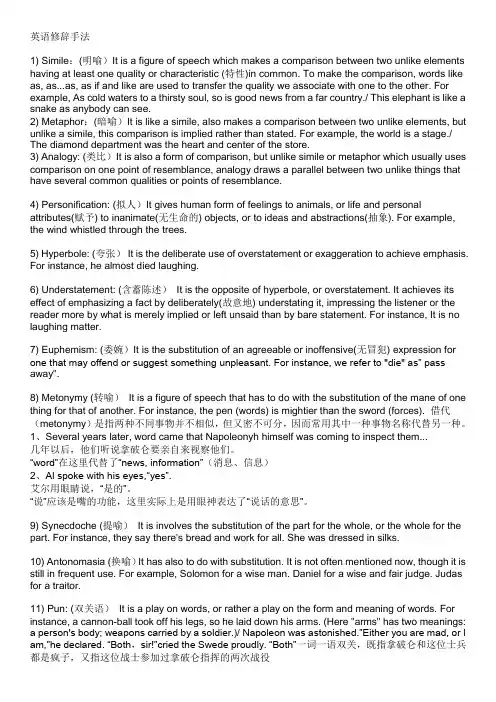
英语修辞手法1) Simile:(明喻)It is a figure of speech which makes a comparison between two unlike elements having at least one quality or characteristic (特性)in common. To make the comparison, words like as, as...as, as if and like are used to transfer the quality we associate with one to the other. For example, As cold waters to a thirsty soul, so is good news from a far country./ This elephant is like a snake as anybody can see.2) Metaphor:(暗喻)It is like a simile, also makes a comparison between two unlike elements, but unlike a simile, this comparison is implied rather than stated. For example, the world is a stage./ The diamond department was the heart and center of the store.3) Analogy: (类比)It is also a form of comparison, but unlike simile or metaphor which usually uses comparison on one point of resemblance, analogy draws a parallel between two unlike things that have several common qualities or points of resemblance.4) Personification: (拟人)It gives human form of feelings to animals, or life and personal attributes(赋予) to inanimate(无生命的) objects, or to ideas and abstractions(抽象). For example, the wind whistled through the trees.5) Hyperbole: (夸张)It is the deliberate use of overstatement or exaggeration to achieve emphasis. For instance, he almost died laughing.6) Understatement: (含蓄陈述)It is the opposite of hyperbole, or overstatement. It achieves its effect of emphasizing a fact by deliberately(故意地) understating it, impressing the listener or the reader more by what is merely implied or left unsaid than by bare statement. For instance, It is no laughing matter.7) Euphemism: (委婉)It is the substitution of an agreeable or inoffensive(无冒犯) expression for one that may offend or suggest something unpleasant. For instance, we refer to "die" as” pass away".8) Metonymy (转喻)It is a figure of speech that has to do with the substitution of the mane of one thing for that of another. For instance, the pen (words) is mightier than the sword (forces). 借代(metonymy)是指两种不同事物并不相似,但又密不可分,因而常用其中一种事物名称代替另一种。
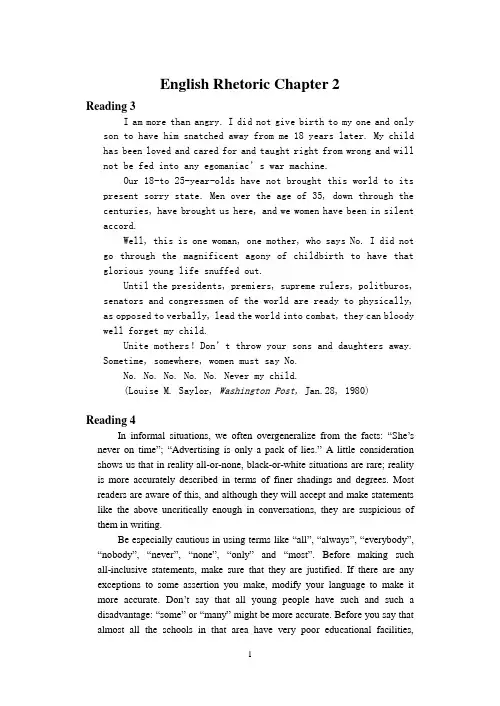
English Rhetoric Chapter 2Reading 3I am more than angry. I did not give birth to my one and onlyson to have him snatched away from me 18 years later. My child has been loved and cared for and taught right from wrong and will not be fed into any egomaniac’s war machine.Our 18-to 25-year-olds have not brought this world to its present sorry state. Men over the age of 35, down through the centuries, have brought us here, and we women have been in silent accord.Well, this is one woman, one mother, who says No. I did not go through the magnificent agony of childbirth to have that glorious young life snuffed out.Until the presidents, premiers, supreme rulers, politburos, senators and congressmen of the world are ready to physically, as opposed to verbally, lead the world into combat, they can bloody well forget my child.Unite mothers!Don’t throw your sons and daughters away.Sometime, somewhere, women must say No.No. No. No. No. No. Never my child.(Louise M. Saylor, Washington Post, Jan.28, 1980)Reading 4In informal situations, we often overgeneralize from the facts: “She’s never on time”; “Advertising is only a pack of lies.”A little consideration shows us that in reality all-or-none, black-or-white situations are rare; reality is more accurately described in terms of finer shadings and degrees. Most readers are aware of this, and although they will accept and make statements like the above uncritically enough in conversations, they are suspicious of them in writing.Be especially cautious in using terms like “all”, “always”, “everybody”, “nobody”, “never”, “none”, “only”and “most”. Before making such all-inclusive statements, make sure that they are justified. If there are any exceptions to some assertion you make, modify your language to make it more accurate. Don’t say that all young people have such and such a disadvantage: “some” or “many” might be more accurate. Before you say that almost all the schools in that area have very poor educational facilities,ascertain from some reliable source whether more than 80 percent actually do;otherwise you are not really justified in saying it. Keep in mind that the English vocabulary provides you with a wealth of qualifying terms (some, few, often, to name only a few) and choose those that most accurately describe the number, extent, and frequency of the facts you are asserting.Exercise twoⅠ. Identify the reasoning pattern used in each of the following passages.1.There seems to be a general assumption that brilliant people cannotstand routine, and that they need a varied, exciting life in order to dotheir best. It is also assumed that dull people are particularly suited fordull work. We are told that the reason present-day young people protestso loudly against the dullness of factory jobs is that they are bettereducated and brighter than the youth of the past. (Eric Hoffer, “DullWork”)2.The cases of Adolf Beck, of Oscar, of the unhappy Brooklyn bank tellerwho vaguely resembled a forger and spent eight years in Sing Sing[State Prison in New Y ork] only to “emerge”a broken, friendless,useless, “compenstated” man—all these, if the dignity of the individualhas any meaning, had better have been dead before the prison door everopened for them. This is what counsel always says to the jury in thecourse of a murder trial and counsel is right: far better to hang this manthan “give him life.”(Jacques Barzun, “In Favor of Capital Punishment”)Ⅱ. Fill in each blank with an appropriate preposition.Emotional fallacies appeal directly (1)_______ the human frailties(2)_______ the audience: some (3)________their prejudices, some (4)________ their vanity, some (5)________their national pride, others(6)_______their desire to emulate people they admire. Because(7)______this, they exert great persuasive force. These fallacies should beavoided (8)______writing (9)______essentially the same reason that you shun slanting: they deceive your readers. Remember how often you have felt cheated because an advertiser convinced you to buy an expensive, ineffective product (10)______ playing (11)______your desire to be attractive (12)______the opposite sex. Using such tactics(13)_______argument can only have short-range effectiveness; yourcommitment should be to make a lasting impression (14)______your readers.(Michael E. Adelstein and Jean G..Pival: The Writing Commitment, 2nd ed. 1980, pp. 328-329)III. An elementary acquaintance with the general patterns of inference can help writers in two ways.,1.It can make them aware of the premises that underlie an argument.Analyze the following example and provide its major premise:“There is a school ahead. Here we come across a traffic sign onwhich there are school children.”2.It can also help a writer check the validity of his line of reasoning.Examine the following example, point out its fallacy and provide possible remedies:Some elected officials are bribe-takers.Smith is an elected official.Therefore, Smith is a bribe-taker.IV. Identify the fallacies of pathos in each of the following paragraphs as “Ad Hominen”, “Name calling”, or “Bandwagon Appeal”with the help of a dictionary.1.Many advertising slogans urge readers to buy something so that they becomeassociated with the majority of people or with a particular prestigious group: “Beer belongs,”“Camels aren’t for everybody (but then, they don’t try to be),”“John the Pepsi generation,”“The car for the people who think,”“长龙,只为少数派的宣言”.2.When challenged by an opponent to discuss military spending, a politicianaccuses the opponent of alcoholism.3.He (the male) is a half dead, unresponsive lump, incapable of giving orreceiving pleasure or happiness; consequently he is at best an utter bore, an inoffensive blob, since only those capable of absorption in others can be charming.。
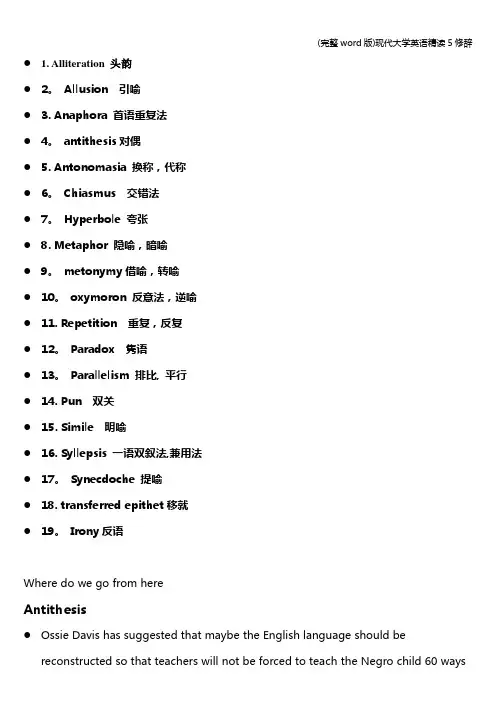
● 1. Alliteration 头韵●2。
Allusion 引喻● 3. Anaphora 首语重复法●4。
antithesis对偶● 5. Antonomasia 换称,代称●6。
Chiasmus 交错法●7。
Hyperbole 夸张●8. Metaphor 隐喻,暗喻●9。
metonymy借喻,转喻●10。
oxymoron 反意法,逆喻●11. Repetition 重复,反复●12。
Paradox 隽语●13。
Parallelism 排比, 平行●14. Pun 双关●15. Simile 明喻●16. Syllepsis 一语双叙法,兼用法●17。
Synecdoche 提喻●18. transferred epithet移就●19。
Irony反语Where do we go from hereAntithesis●Ossie Davis has suggested that maybe the English language should bereconstructed so that teachers will not be forced to teach the Negro child 60 waysto despise himself,and thereby perpetuate his false sense of inferiority, and the white child 134 ways to adore himself,and thereby perpetuate his false sense of superiority。
(para4)●As long as the mind is enslaved,the body can never be free。
(para5)●Psychological freedom ...。
..physical slavery (para5)●And one of the great problems of history is that the concepts of love and powerhave usually been contrasted as opposites - polar opposites——so that love is identified with a resignation of power, and power with a denial of love. (para7)●For through violence you may murder a murderer but you can’t murder.(para19)●The dark yesterdays of segregated schools will be transformed into brighttomorrows of quality,integrated education. (para. 25)●There will be those moments when the buoyancy of hope will be transformed intothe fatigue of despair。
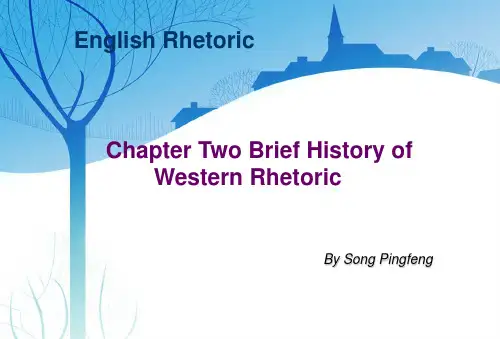
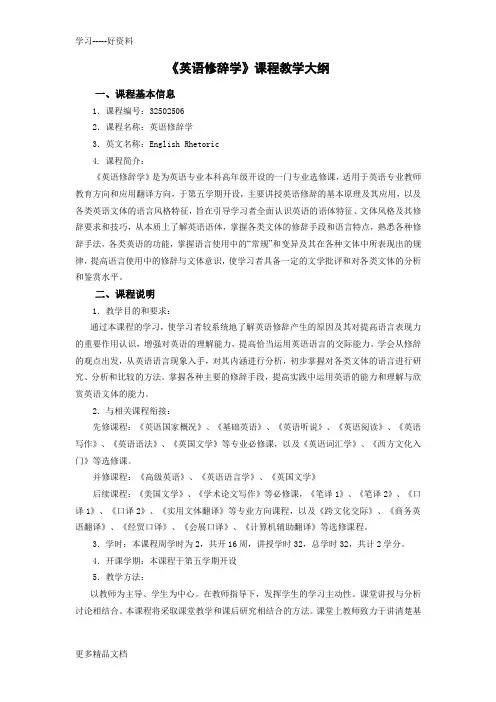
《英语修辞学》课程教学大纲一、课程基本信息1.课程编号:325025062.课程名称:英语修辞学3.英文名称:English Rhetoric4. 课程简介:《英语修辞学》是为英语专业本科高年级开设的一门专业选修课,适用于英语专业教师教育方向和应用翻译方向,于第五学期开设,主要讲授英语修辞的基本原理及其应用,以及各类英语文体的语言风格特征,旨在引导学习者全面认识英语的语体特征、文体风格及其修辞要求和技巧,从本质上了解英语语体,掌握各类文体的修辞手段和语言特点,熟悉各种修辞手法,各类英语的功能,掌握语言使用中的“常规”和变异及其在各种文体中所表现出的规律,提高语言使用中的修辞与文体意识,使学习者具备一定的文学批评和对各类文体的分析和鉴赏水平。
二、课程说明1.教学目的和要求:通过本课程的学习,使学习者较系统地了解英语修辞产生的原因及其对提高语言表现力的重要作用认识,增强对英语的理解能力,提高恰当运用英语语言的交际能力。
学会从修辞的观点出发,从英语语言现象入手,对其内涵进行分析,初步掌握对各类文体的语言进行研究、分析和比较的方法。
掌握各种主要的修辞手段,提高实践中运用英语的能力和理解与欣赏英语文体的能力。
2.与相关课程衔接:先修课程:《英语国家概况》、《基础英语》、《英语听说》、《英语阅读》、《英语写作》、《英语语法》、《英国文学》等专业必修课,以及《英语词汇学》、《西方文化入门》等选修课。
并修课程:《高级英语》、《英语语言学》、《英国文学》后续课程:《美国文学》、《学术论文写作》等必修课,《笔译1》、《笔译2》、《口译1》、《口译2》、《实用文体翻译》等专业方向课程,以及《跨文化交际》、《商务英语翻译》、《经贸口译》、《会展口译》、《计算机辅助翻译》等选修课程。
3.学时:本课程周学时为2,共开16周,讲授学时32,总学时32,共计2学分。
4.开课学期:本课程于第五学期开设5.教学方法:以教师为主导、学生为中心。
simile1.It is as though he suddenly came out of a dark tunnel and found himself beneath the open sky2.They are like the musketeers of Dumas…3.The Elizabethans blew on it as on a dandelion clock, and floated to the ends of the earth.metaphor1... and it is not easy for him to step out of that lukewarm bath2.It is not until he is released from the habit of flexing his muscles and proving that he is just a “regular guy” that he realizes how crippling this habit has been3.The glow of the conversation burst into flames.4.The conversation was on wings.5.The glow of the conversation burst into flames.6.I have an unending love affair with dictionaries7.we ought to think ourselves back into the shoes of the Saxon peasant.8.We can batten down and ride it out9.Wind and rain now whipped the house.mixed metaphor1.and no one has any idea where it will go as it meanders or leaps and sparkles or just glows.metonymy – change of name – the association of two unlike things[mi'tɔnimi] 转喻,借代He met his Waterloo. He likes to read Hemingway.1.In short, all of these publications are written in the language that the Third International describessynecdoche – whole for part or part for whole[si'nekdəki] 提喻He has many mouth to feed in his family. China beat South Korea 3 to 1. The vineyard are intersected by channels, red and yellow sails glide slowly through the vines. Nowadays more and more people have a liking for cotton.1.But neither his vanity nor his purse is any concern of the dictionary' s2.yet both racing to alter that uncertain balance of terror that stays the hand of mankind's final war.alliteration1.… a concept of how things get written that throws very little light on Lincoln but a great deal on Life2.ask of us here th e same high standards of strength and sacrifice…3.One form of colonial control shall not have passed away.4.We shall always hope to find them strongly supporting their own freedom.5.We pledge the loyalty of faithful friends.6.We shall pay any price, bear any burden7.To assure the survival and the success of libertyassonance (元韵、母韵、半谐音) and antithesis… between the much-touted Second International (1934) and the much-clouted Third International (1961)antithesis – contrary in meaning but similar in form 对比1.If a free society cannot help the many who are poor, it cannot save the few who are rich2.Let both sides explore what problems unite us instead of belaboring those problems which divide us.3.Let us never negotiate out of fear, but let us never fear to negotiate.4.And so, my fellow Americans ask not what your country can do for you; ask what you can do for your country.parallelism – ideas are paired and sequenced in the same grammatical form1.Both sides overburdened by the cost of modern weapons, both rightly alarmed by the steady spread of the deadly atom2.Together let us explore the stars, conquer the deserts, eradicate disease, tap the ocean depths and encourage the arts and commerce.3.We renew our pledge of support to prevent it from becoming merely a forum for invective, to strengthen its shield of the new and the weak, and to enlarge the area in which its writ may run.4.We shall pay any price, bear any burden, meet any hardship, support any friend, and oppose any foe to assure the survival and the success of liberty.5.A new generation of Americans, born in this century, tempered by war, disciplined by a hard and bitter peace.repetition –repetition of sounds, words, or sentences that can create good rhythm and parallelism to make the language musical, emphatic, and memorable. 反复1.We dare not tempt them with weakness. For only when our arms are sufficient beyond doubt can we be certain beyond doubt that they will never be employed.2.Bring the absolute power to destroy other nations under the absolute control of all nations.personification1.A moment later, the hurricane, in one mighty swipe, lifted the entire roof off the house and skimmed it 40 feet through the air.2.… it seized a 600, 000-gallon Gulfport oil tank and dumped it3.5 miles away.3.They flared their nostrils and pranced and boasted to one anothertransferred epithet 移就He had some cheerful wine at the party. He ate with a wolfish appetite. a helpless smile a protesting chair a blind haste1.Apartments there held a hurricane party to watch the storm from their spectacular vantage point.2.and his choice of a vocation does not cause him any uneasy wonder as to whether or not it will cost him all his friends.3.A bound-less and generous contentment, a magnanimous triumph felt not against some outer enemy but in communion with the finest and fairest in the souls of all men everywhere and the splendor of the world's summer4.The faces of small children are amiably sticky; in the benign grey beard of a man a couple of crumbs of rich pastry are entangled.5.The others never come close, but peer in at it with frightened, disgusted eyes.synesthesia [.sinəs'θi:ʒiə] 通感the music breathing from her face heavy perfume and noisy color 浓郁的香气和刺眼的色彩He gave me a sour look.1.Children dodged in and out, their high calls rising like the swallows’ crossing flights over the music and the singing.2.One could hear the music winding through the city streets, … bells.exaggeration/ hyperbole [hai'pə:bəli] 夸张1.Perhaps it is because of my up-bringing in English pubs2.In the long history of the world, only a few generations have been granted the role of defending freedom in its hour of maximum danger.。
高英2修辞超详细整理Lesson 1simileThe children went from adult to adult like buckets in a fire brigade.The wind sounded like the roar of a train passing a few yards away.Telephone poles and 20-inch-thick pines cracked like guns as the winds snapped them.Blowdown power lines coiled like black spaghetti over the roads.metaphorWe can batten down and ride it outWind and rain now whipped the house.Strips of clothing festooned the standing treesCamille, meanwhile, had raked its way.Household and medical supplies streamed in by plane.personification1.A moment later, the hurricane, in one mighty swipe, lifted the entire roof off the house and skimmed it 40 feet through the air.2.… it seized a 600, 000-gallon Gulfport oil tank and dumped it3.5 miles away.transferred epithet 移就1.Apartments there held a hurricane party to watch the storm from their spectacular vantage point.Lesson 3simile1.They are like the musketeers of Dumas…2.The Elizabethans blew on it as on a dandelion clock, and floated to the ends of the earth.metaphor1.The glow of the conversation burst into flames.2.The conversation was on wings.3.we ought to think ourselves back into the shoes of the Saxon peasant.4.I have an unending love affair with dictionaries.5.The fact that their marriages may be on the rocks,or that their love affairs have been broken or even that they got out of bed on the wrong side is simply not a concern.6.When E.M.Forster writes of “the sin ister corridor of our age,”we sit up at thevividness of the phrase,the force and even terror in the image.7.Even with the most educated and the most literate,the King’s English slips and slides in conversation.—metaphor ,alliteration8.…no one has any id ea where it will go a s it meanders or leaps and sparkles or just glows.9.…did not delve into each other..10.…suddenly the alchemy of conversation took place,…11.Otherwise one will bind the conversation, one will not let it flow freely here and there.12.We would never have gone to Australia, or leaped back in time to the Norman Conquest.Lesson 4metaphor1.in the past,those who foolishly sought power by riding the back of the tiger ended up inside.2.But this peaceful revolution of hope cannot become the prey of hostile powers.3.And let every other power know that this hemisphere intend to remain the master of its own house.4...to strengthen its shield of the new and the weak.5.And if a beachhead of cooperation may push back the jungle of suspicion6.The energy, the faith, the devotion which we bring to this endeavor will light our country and all who serve it, and the glow from that fire can truly light the world.synecdoche – whole for part or part for whole[si'nekd?ki] 提喻1.yet both racing to alter that uncertain balance of terror that stays the hand of mankind's final war.alliteration1.ask of us here the same high standards of strength and sacrifice…2.One form of colonial control shall not have passed away.3.We shall always hope to find them strongly supporting their own freedom.4.We pledge the loyalty of faithful friends.5.We shall pay any price, bear any burden6.To assure the survival and the success of liberty7.Let the word go forth from this time and place,to friend and foe alike.antithesis – contrary in meaning but similar in form 对偶1.If a free society cannot help the many who are poor, it cannot save the few who arerich2.Let both sides explore what problems unite us instead ofbelaboring those problemswhich divide us.3.Let us never negotiate out of fear, but let us never fear to negotiate.4.And so, my fellow Americans ask not what your country can do for you; ask whatyou can do for your country.5.United,there is little we cannot do in a host of co-operative ventures.Divided,there is little we can do,for we dare not meet a powerful challenge at odds and split asunder. parallelism – ideas are paired and sequenced in the same grammatical form1.Both sides overburdened by the cost of modern weapons, both rightly alarmed bythe steady spread of the deadly atom2.Together let us explore the stars, conquer the deserts, eradicate disease, tap theocean depths and encourage the arts and commerce.3.We renew our pledge of support to prevent it from becoming merely a forum forinvective, to strengthen its shield of the new and the weak, and to enlarge the area inwhich its writ may run.4.We shall pay any price, bear any burden, meet any hardship, support any friend, andoppose any foe to assure the survival and the success of liberty.5.A new generation of Americans, born in this century, tempered by war, disciplinedby a hard and bitter peace.6.Symbolizing an end as well as a beginning, signifyingrenewal as well as change(parallelism and repetition) repetition –repetition of sounds, words, or sentences that can create good rhythm and parallelism to make the language musical, emphatic, and memorable. 反复1.We dare not tempt them with weakness. For only when our arms are sufficientbeyond doubt can we be certain beyond doubt that they will never be employed.2.Bring the absolute power to destroy other nations under the absolute control of allnations.3.Symbolizing an end as well as a beginning, signifying renewal as well as change(parallelism and repetition)4...convert good words into good deeds...to assist free men and free government…5.Abolish all forms of human poverty and all forms of human life6. And yet the same revolutionary belief for which..., the belief that ...7.... These human rights to which this nation has always been committed, and to which we are committed today ...allusionAll this will not be finished in the first one hundred days.—historical allusion,climax Lesson 5simile1.My brain was as powerful as a dynamo, as precise as a chemist’s scales, as penetrating as a scal pel.2....the raccoon coat huddled like a hairy beast at his feet.3....dumb as an ox.4.He looked at the coat with the expression of a waif at abakery window.5.It was like digging a tunnel.6...bellowing like a bull.metaphor1.Charles Lamb,as merry and enterprising a fellow as you will meet in a month of Sundays,unfettered the informal essay with his memorable Old China and Dream’s Children.2.There follows an informal essay that ventures even beyond Lamb’s frontier.3.logic,far from being a dry,pedantic discipline,is a living,breathing thing,full of beauty,passion,and trauma.—metaphor,hyperbole4.Maybe somewhere in the extinct crater of her mind,a few embers still smoldered.Maybe somehow I could fan them into flame.—metaphor,extended metaphor5.He has hamstrung his opponent before he could even start.6.My brain, that precision instrument, slipped into high gear. Mixed metaphor7. The next fallacy is called Poisoning the Well.8. The first man has poisoned the well before anybody could drink from it.metonymy –change of name –the association of two unlike things [mi't?nimi] 转喻,借代1.I was not one to let my heart rule my head.2.Otherwise you have committed a Dicto Simpliciter.3.After all, surgeons have X-rays to guide them during an operation.4.You are guilty of Post Hoc if you blame...synecdoche – whole for part or part for whole[si'nekd?ki] 提喻There is a limit to what flesh and blood can bear.(synecdoche) exaggeration/ hyperbole [hai'p?:b?li] 夸张1..... logic,far from being a dry,pedantic discipline,is a living,breathing thing,full of beauty,passion,and trauma.—metaphor,hyperbole2. It is not often that one so young has such a giant intellect (hyperbole)3.He just stood and stared at with a mad lust at the coat. (hyperbole)4.You are the whole world to me, and the moon and the stars and the constellations of outer space. (hyperbole)5..My brain was as powerful as a dynamo, as precise as a chemist’s scales,as penetrating as a scalpel (simile, hyperbole, and parallelism, irony)6. I will wander the face of the earth, a shambling, hollow-eyed hulk.antithesis – contrary in meaning but similar in form 对偶1.Back and forth his head swiveled,desire waxing,resolution waning.2..It is, after all, to make a beautiful dumb girl smart than to make an ugly smart girl beautiful.3. If there is an irresistible force, there can be no argument. If there is an immovable object, there can be no irresistible force.4. Look at me --- a brilliant student, a tremendous intellectual,a man with an assured future. Look at Petey--- a knothead, a jitterbug, a guy who’ll never know where his next meal is coming from.Litotes / understatementThis loomed as a project of no small dimensions.Transferred epithetI said with a mysterious wink.Lesson 7metaphor1.Here was the very heart of industrial America,the center of its most lucrative and characteristic activity,the boast and pride of the richest and grandest nation ever seen on earth—and here was a scene so dreadfully hideous,so intolerably bleak and forlorn that it reduced the whole aspiration of man to a macabre and depressing joke.—metaphor,hyperbole,antithetical contrast.2.When it has taken on the patina of the mills it is the color of an egg long past all hope or caring.—ridicule ,irony,metaphor3.And one and all they are streaked in grime,with dead and eczematous patches of paint peeping through the streaks.4. It is that of a Presbyterian grinning.5.Out of the melting pot emerges a race which hates beauty as it hates truth.antithesis – contrary in meaning but similar in form 对偶1.Here was wealth beyond computation,almost beyond imagination—and here were human habitations so abominable that they would have disgraced a race of alley cats.—hyperbole,antithetical contrast2.Here was the very heart of industrial America,the center of its most lucrative and characteristic activity,the boast and pride of the richest and grandest nation ever seen on earth—and here was a scene so dreadfully hideous,so intolerably bleak and forlorn that it reduced the whole aspiration of man to a macabre and depressing joke.—metaphor,hyperbole,antithetical contrast exaggeration/ hyperbole [hai'p?:b?li] 夸张1.Here was the very heart of industrial America,the center of its most lucrative and characteristic activity,the boast and prideof the richest and grandest nation ever seen on earth—and here was a scene so dreadfully hideous,so intolerably bleak and forlorn that it reduced the whole aspiration of man to a macabre and depressing joke.—metaphor,hyperbole,antithetical contrast2.Here was wealth beyond computation,almost beyond imagination—and here were human habitations so abominable that they would have disgraced a race of alley cats.—hyperbole,antithetical contrast3.It is as if some titanic and aberrant genius,uncompromisingly inimical to man,had devoted all the ingenuity of Hell to the making of them.—hyperbole ,irony Antonomasia1.Safe in a Pullman,Ihave whirled through the gloomy,God-forsaken villages of Iowa and Lansas,and the malarious tidewater hamlets of Georgia.—antonomasiaIrony1.Cool was I and logical (Inversion/irony)2.My brain was as powerful as a dynamo, as precise as a chemist’s scales, as penetrating as a scalpel (simile, hyperbole, and parallelism, irony)3.It is as if some titanic and aberrant genius,uncompromisingly inimical to man,had devoted all the ingenuity of Hell to the making of them.—hyperbole ,irony4.They like it as it is:beside it,the Parthenon would no doubt offend them.—irony5.When it has taken on the patina of the mills it is the color of an egg long past all hope or caring.—ridicule ,irony,metaphor6.I award this championship only after laborious research and incessant prayer.—irony7.Obviously,if ther were architects of any professional senseor dignity in the region,they would have perfected a chalet to hug the hillsides—a chalet with a highpitched roof,to throw off the heavy winter snows,but still essentially a low and clinging building,wider than it was tall.—sarcasmLitotes/ understatementThe country itself is not uncomely,despite the grime of the endless mills.Lesson 10Metaphor1.we had reached an international stature that would forever prevent us from retreating behind the artificial walls of a provincial morality or the geographical protection of our two bordering oceans.2.it became increasingly difficult for our young people to accept standards of behavior that bore no relationship to the bustling business medium in which they were expected to battle for success.3.The war acted merely as a catalytic agent in this breakdown of the Victorian social structure.4.Younger brothers and sisters of the war generation...now began to imitate the manners of their elders and play with the toys of vulgar rebellion.5... to add their own little matchsticks to the conflagration of “flaming youth”,6.....called the party to a halt and forced the revellers to sober up7....had received a good taste of twentieth-century warfare.8.they had outgrown town and families9. An important book was the rallying point of sensitive personsmetonymy –change of name –the association of two unlike things [mi't?nimi] 转喻,借代1.it was only natural that hopeful young writers,their minds and pens inflamed against war,Babbittry,2. since the country was blind and deaf to everything save the glint and ring of the dollar,3. Greenwich Village set the pattern.4.it was Greenwich Village that fanned the flames.(metonymy;metaphor)5.before long the movement had become officially recognised by the pulpitpersonification1.These defects would disappear if only creative art were allowed to show the way to better things,but since the country was blind and deaf to everything ...transferred epithet 移就1The slightest mention of the decade brings nostalgic recollections to the middle-aged and curious questionings by the young:memoriesLesson 12simile1.It is as though he suddenly came out of a dark tunnel and found himself beneath the open sky8.Whatever the Europeans may actually think of artists,they have killed enough of them off by now to know that they are as real—and as persistent—as rain,snow,taxes or businessmen.metaphor1... and it is not easy for him to step out of that lukewarm bath2.It is not until he is released from the habit of flexing hismuscles and proving that he is just a “regular guy” that he realizes how crippling this habit has been24.when it did,I like many a writer before me upon the discovery that his props have all been knocked out from under him,suffered a species of breakdown ad was carried off to the mountains of Switzerland.25.There,in that absolutely alabaster landscape armed with two Bessie Smith records and a typewriter I began to try to recreate the life that I had first known as a child and from whichI had spent so many years in flight.26.Once I was able to accept my role—as distinguished,I must say,from my”place”—in the extraordinary drama which is America,I was released from the illusion that I hated America.27.It is not meant,of course,to imply that it happens to them all,for Europe can be very crippling too;and,anyway,a writer,when he has made his first breakthrough,has simply won a crucial skirmish in a dangerous,unending and unpredictable battle.—metaphor 28.In this endeavor to wed the vision of the Old World with that of the New,it is the writer,not the statesman,who is our strongest arm.—metaphor…a writer, when he has made his first breakthrough, has simply won a crucial skirmish in a dangerous, unending and unpredictable battle.It is not until he is released from the habit of flexing his muscles and proving that he is just a “regular guy” that he realizes how crippling this habit has beenAn American writer fights his way to one of the lowest rungs on the American social ladder by means of pure ….. and it is not easy for him to step out of that lukewarm bath He needs sustenance for his journey每个社会其实都是由一些潜在的规律,由一些人们没有说出来但却深深感觉到并看作是理所当然的事物所支配的,我们的社会也不例外。
1。
Where do we go from here?〈1〉,as long as the mind is enslaved, the body can never be free.Antithesis:mind vs。
body; enslaved vs。
free。
对仗手法〈2>psychological freedom is the most powerful weapon against the long night of physical slavery.Metaphor: comparing the long history of slavery to a long night。
The word” night”is used here to indicate a period of darkness and gloom, a period of moral degeneration。
<3〉,love is identified with a resignation of power,and power with a denial of love。
Antithesis:the speaker works on the two words ”love" and “power”in order to bring out the contrast。
〈4〉what is needed is a realization that power without love is reckless and abusive, and love without power is sentimental and anemic.Parallel structure<5〉power at its best is love implementing the demands of justice,and justice at its best is power correcting everything that stands against love。
现代大学英语6修辞总结------------------------------------------作者------------------------------------------日期高英II 修辞总结Unit 1 : 1. Satire:1) This is associated with the names of David Ricardo, a stockbroker, and Thomas Ro bert Maltus, a divine.2) Murray is the voice of Spencer our time; he is enjoying, as indicated, unparalleled popularity in high Washington circles. 2. Irony:1) This is, in some ways, an admirable solution.2) Couples in love should repair to R.H. Macy’s, not their bedrooms 3) ```Social Darwinism came to be considered a bit too cruel. 4) It has again become a major philosophical, literary, and rhetorical preoccupation, and an economically not unrewarding enterprise. 5) In the enduring w ords of Professor Milton Friedman, people mustbe “free to choose”.6) All, save perhaps the last, are great inventive descent formBentham, Malthus, and Spencer.3. Critical attitude: The only form of discrimination that is still permissinle```is discri mination against people who work for the federal government, especially on social we lfare activities.Unit 2: 1. Simile:1) Its underwater grasses looked like green ribbons constantly unrolling, and the trees held thick sprays of wild orchids. 2) The burly arms of the oaks were huge with ferns and blooming bromeliads.3) The native whites feared him as you would a rattlesnake, but``` 2. Foreshadowing:I heard that countless human skeletons were left bare in his bayou once whe n a hurricane blew the water out.3. Suggestion: He had secluded himself in this remote area of the Everglades because he was not welcome elsewhere; from time to time he was halfheartedly sought for tria l,```4. Understatement: There was the little shack, not the most gracious of living quarters, and there was a murderer for our nearest and only neighbor, about thirty miles away.5. Quotation :(a legend): But these marks o wild country called to my father like the le gendary siren song.6. Comparison: 1) King Richard in his gluttony never sat at a table more sumptuous th an ours was three times a day.2) With the weight of this new stillness on it, this seal.Unit 3:1. Allusion: Like Creation, the portending global events are cosmic: Theychange the relationship between the planet Earth and its star, the sun.2. Metaphor: 1) It is not so much a battle cry for one side or the other,as a design for negotiating and end to suicidal war—for making peace with the planet.2) How all my town territory would be altered, as if alandslide had gone through it and skimmed off all meaning except loss of Mike.3. Pun: But unlike the conventional marketplace, which deals ingoods—things that serve a useful purpose—this scheme creates a marketplace in “bads”—things that are not only useless but often deadly.Unit 4:1. Personification: Each of the trees on the place had an attitude and apresence—the elm looked serene and the oak threatening, the maples friendly, the hawthorn old a nd crabby.3. Alliteration: She did not ask me—was it delicacy or disapproval?4. (通感):1) All afternoon while the men were gone I was full of happyenergy. (happy 实际上是用来修饰“我”)4. Parallel structure: Against the belief in the all-encompassing power of single explanation, against```, against```(unit 5)Unit 6:1. Pseudo-serious tone: The creams, slightly muffled by oil,```as though torture were being carri ed out but they didn’t last long: It was all over rather suddenly, and, his legs released, the pig righted hims elf. 2. Biblical allusion:1) From then until the time of his death I held the pig steadily in the bowl of my mind;2) The pig’s lot and mine inextricably bound now, as though the rubber tube were the silver cord.3. Alliteration: But even so, there was a directness and dispatch about animal burial.4. Symbolize: He had evidently become precious to me, not that he represented a dista nt nourishment in a hungry time, but that he had suffered in a suffering world.(对作者来说,the suffering of the pig symbolizes the suffering of human beings.)5. Humorous:1) The frequency of our trips down the footpath through the orchardto the pig yard delighted him, although he suffers greatly arthritis, moves with difficul ty, and would be bedridden if he could find anyone willing to serve him meals on the t ray.2) I have come to believe that there is in hostesses a special power ofdivination, and that they deliberately arrange dinners to coincide with pig failure or so me other sort of failure.(humorously accuses the hostesses )3) This was slapstick—the sort of dramatic treatment that instantlyappealed to my old dachund, Fre,```presided at the interment. 4) This uncertainty affli cts me with a sense of personaldetermination; if I were in decent health I would know how many nights I had sat up with a pig.6. Parallel structure:1) ```with the fog shutting in every night, scaling for a few hours inmid-day, then creeping back again at dark, drifting in first over the trees on the point, then` ``2) ```everything about the last scene seemed overwritten—the dismalsky, the shabby woods, the imminence of rain, the worm``。